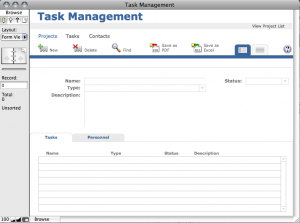A badly managed database is largely useless!
Imagine the last time you opened your computer diary and changed a meeting. The diary is a database of events, and adjusting the details means that you always know what you are doing. More importantly, so do your colleagues. Now imagine not amending it for a few days. You quickly realise that your diary becomes unusable and you are likely to be less effective. A database is at the bottom of a wide spread of software; Accounting packages, diaries, address books, blogs, they all need managing.
Before we start developing a system, we discuss this aspect of it. In many ways, it’s as important as backing up! A CRM [Customer relationship management] is a linked set of modules that can cover everything from contacts to projects, estimates to invoices, and allows a company to input the small details that link up to form the collected details everyone can access. If one person enters a name, another can add their job title or telephone number.

Whether you develop the database yourself, or commission Operandi to set it up, you need to make sure that your company, and its employees, are ready to micro manage the details the way you need them to. You should also assess the processes you currently use, as not all of them will relate to the way people use a database.
Overall, people need to know that if they don’t keep up with the management of the information, they may realise at some point that problems are not far away. That said, the benefits to your staff will be evident in the first week.
